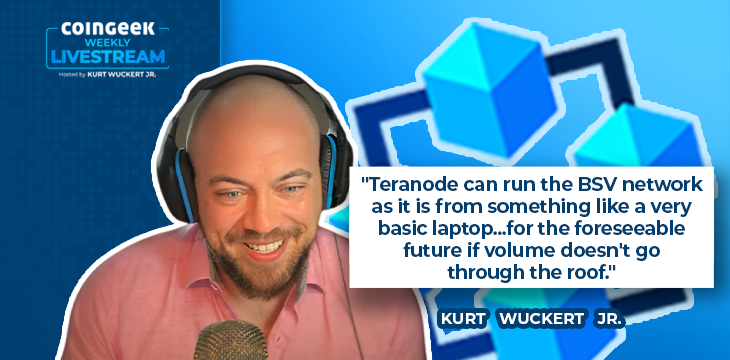|
Getting your Trinity Audio player ready...
|
Kurt Wuckert Jr. hosted an Ask Me Anything on the latest episode of the CoinGeek Weekly Livestream. He answered questions about Bitcoin, scaling, mining, and much more.
Dr. Craig Wright’s legal situation
The first viewer question of the CoinGeek Weekly Livestream asks if August 5 is a new legal start for Dr. Craig Wright.
Wuckert clarifies that Wright has posted a legal notice on X and on his website that he is not Satoshi Nakamoto. However, he has filed an appeal, which will begin on August 5.
What would the grounds for such an appeal be? They could be many, but the poor job the expert witness did could certainly be one of them.
What’s up with Teranode? Rumors are that it’s too expensive.
Wuckert says the rumors that Teranode is too expensive to continue are false and are based on a misunderstanding. The team is pushing the limits, and these tests are what is expensive. Critics can try to mischaracterize the situation all they want, but Teranode goes on, and the team is extremely excited about it.
Will Silicon Valley allow a public ledger to compete with its data monopoly?
Wuckert responds with a question of his own: did the Catholic Church allow the Protestant Reformation and the widespread printing and interpretation of the Bible in different languages? The answer is no, but it happened anyway.
The reformation and printing of the Bible caused people to better understand the technology of the day (the written word). Within one generation, the Catholic church had lost its monopoly and much of its power.
However, the incumbents didn’t allow this to happen without a fight. They pushed back, and Silicon Valley is doing the same. They will ultimately lose, but many leaders will remain fabulously wealthy.
BRICS has adopted blockchain technology. How will this affect things?
Wuckert says there are some interesting countries in BRICS. However, nobody would voluntarily keep assets there if they had better options, such as in the United States. Ultimately, he feels BRICS is a non-starter and the low-trust countries in it won’t pose much of a challenge in the long run.
What’s cool about functional NFTs, HTML Ordinals, Recursive ORD-FS, etc?
There’s so much that’s cool in all of this, Wuckert says. When you have a monetized data ledger and a monetized communications network, all kinds of interesting opportunities open up. Different types of Ordinals can point to each other, building an internet incentivized by monetary transactions rather than ad revenue.
After all this chaos, BSV is still up and running?
“Yes,” Wuckert answers. It’s very difficult to kill a proof-of-work blockchain, and BSVers are the only ones doing fundamental research into how to make all of this valuable in the long run.
To hear more about mining economics, the MNEE stablecoin, and how Bitcoin can change the internet, watch the livestream through the link below.
Watch: Realizing the vision for Bitcoin beyond crypto

 02-23-2026
02-23-2026 




